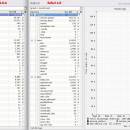du2rrd for Linux 0.0.6
du2rrd - Long Term Disk Space Monitoring
Are you running a big Unix/Linux? file server with many users.? Are you interested in keeping track on how they use up all that space?
Then du2rrd is for you. It visualizes disk space usage in a state of the art Ajax Web GUI. It uses RRDtool for data storage and graphing.
du2rrd takes ouput from du, parses it and adds it to RRD files. ...
| Author | Tobias Oetiker |
| License | Open Source |
| Price | FREE |
| Released | 2008-12-07 |
| Downloads | 233 |
| Filesize | 358 kB |
| Requirements | |
| Installation | Instal And Uninstall |
| Keywords | disk space monitoring, hard drive monitoring, system monitoring, disk, space, harddrive |
| Users' rating (12 rating) |
Using du2rrd for Linux Free Download crack, warez, password, serial numbers, torrent, keygen, registration codes,
key generators is illegal and your business could subject you to lawsuits and leave your operating systems without patches.
We do not host any torrent files or links of du2rrd for Linux on rapidshare.com, depositfiles.com, megaupload.com etc.
All du2rrd for Linux download links are direct du2rrd for Linux full download from publisher site or their selected mirrors.
Avoid: linux directories oem software, old version, warez, serial, torrent, du2rrd for Linux keygen, crack.
Consider: du2rrd for Linux full version, linux directories full download, premium download, licensed copy.




